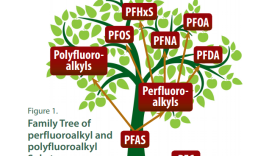U.S. Senator Kirsten Gillibrand hosted a roundtable discussion with community leaders and advocates Monday in Hoosick Falls where she provided details on new legislation intended to address PFAS contamination and require medical monitoring for those affected by pollution.
The last time Senator Gillibrand came to Hoosick Falls, it was July 2016 for a roundtable discussion on PFOA contamination. During the visit, the Democrat pledged to ban PFOA – the primary contaminant found in the village’s water supply, as well as private wells in the Town of Hoosick, and the nearby Town of Petersburgh.
Hoosick Falls has come a long way since the “emerging contaminant” was first detected, with filtration systems installed in homes and the municipal water supply. New York State has set new maximum contaminant levels for compounds PFOA and PFOS.
But, as Village Mayor Rob Allen said on Monday, there’s been one thing that residents are still in need of:
“The one big thing that has been lacking is medical monitoring, something that is very specific and needed because it is due to an exposure to industrial practices of which we had no control,” said Allen.
Gillibrand’s PFAS Accountability Act would do several things, accoring to the Senator: create a standard for PFAS explosure, make the class of chemicals illegal for use, fund epidemiological research on the compounds, and create a national medical monitoring program. PFAS exposure has been linked to several ill-health effects including forms of cancer.
Gillibrand compared her new legislation to the 2010 law that protects first responders and others affected by the 9/11 attacks.
“We do it with the 9/11 Health Bill, so 70,000 people registered, and some aren’t even sick yet, but they’re part of the system so they’ll be given updates about, ‘Oh, breakthrough on treatment here.’ Update on ‘Great new doctor there.’ So they’re part of a community and this bill fund that same community for this group,” said Gillibrand.
At the state level, legislation was once introduced by then-State Senator Kathy Marchione to direct the state Department of Health to conduct medical monitoring for residents of Hoosick Falls, the Town of Hoosick, and Petersburgh, but the bill stalled.
Under Gillibrand’s wider-reaching legislation, federal courts would be able to award medical monitoring to those affected by pollution.
Michael Hickey, who began working to expose the presence of PFAS compounds in the village after his father died of a rare cancer in 2013, said Gillibrand’s legislation is “a big step.”
“It’s a big step of what we asked for in the beginning, you know, seven years ago when I started, six years ago when it went public. Medical monitoring was always on the radar. People are still getting sick,” said Hickey.
People like Bob Decker, a newly elected village trustee who underwent treatment for testicular cancer, a disease linked to PFAS exposure.
“I’ve been cancer-free for one year. I did chemo for three months, it was tough. It was tough. I come out of it, I’m lucky. So that’s why I’m out…this monitoring. Because I got this cancer. What if I got another one?” asked Decker.
Decker wants to make sure the medical community across the country is educated about the pervasive chemicals.
“Make it just a part of the yearly physical for everyone in the world to get their PFAS levels checked,” said Decker.
Gillibrand hopes to see a medical monitoring system made available across the country, not just upstate New York.
“Once it we create this law, then it will just as easy if you live in West Virginia or Michigan or New Hampshire, where we have great deals of PFAS pollution. So I do think over time it will get easier,” said Gillibrand.
Just over the state line in Bennington, Vermont, where water supplies are similarly contaminated, state lawmakers last month announced a third push for legislation to require polluters pay for medical monitoring for those affected by PFAS pollution.








